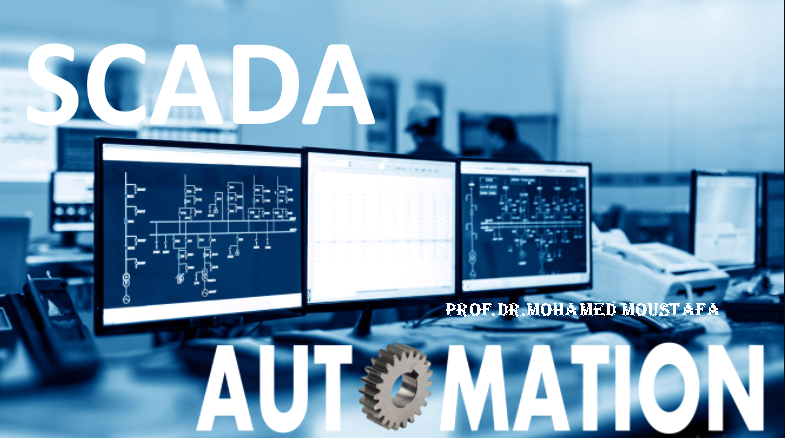SCADA-Automation |
Instructor
|
|
The course spans more than 24 hours over 2 Weeks .
Date:- 18 / 8 / 2019 Location: iHub CHEP Training Credit: 4 weeks Cost: For Under graduates 2 Credit Hours For Graduates 3000 EGP |
Prof. M. A. Moustafa Hassan, Faculty of Eng., Cairo University, Giza, Egypt
|
Course Description:
The objective of this course is to make the attendants familiar with the architecture, hardware components, and Software of the SCADA system. Therefore this course introduces the basic construction and the main components of the PLC system such as Input/Output modules, communication interface cards, and main central Processing Units CPUs will be covered in details.
The features of the programmable controllers will be also covered. Furthermore, this course presents the different applications of Programmable Logic Controllers (PLC) in process control, specially the sequential controls. Moreover, SCADA Concepts and components will be covered.
Course Objectives
By the end of this course, the trainee should:-
1) Know the different control systems types.
2) Learn in detail the basic construction and the main components of the PLC system.
3) Recall the scan cycle of the PLC system.
4) Understand the Principles of programming of PLC system.
5) Know the difference between PLC systems,
6) Learn more about the different applications of Programmable Logic Controllers (PLC) in process control.
7) Describe the SCADA Components.
8) List the SCADA Functions and features.
9) Discuss the applications of SCADA in Process Control.
Section 1: Introduction to Programmable Logic Controllers:-
PLC History & What Is PLC?
PLC function in Industry.
Basic PLC Components and Operation.
CPU Scan Cycle.
Advantages and disadvantages of the PLC.
Section 2: The Concept of SCADA:-
a) Where is SCADA Used?
b) What's the Value of SCADA to You?
c) Real-Time Monitoring and Control Increases Efficiency and Maximizes Profitability
Section 3: Functions of SCADA Systems:-
a) Functions of A SCADA system
b) RTU (Remote Telemetry Unit) Capacity and Function
c) Installation d) Data Acquisition
e) Data Communication
f) RTU (Remote Telemetry Unit) Features
g) Data Presentation h) Control
Section 4: Evaluation of SCADA Systems and Hardware
a) The Two Most Important Components of Your SCADA System
b) A Brief Note on Sensors and Networks
c) The Flexible RTU (Remote Telemetry Unit) That Handles All variabes.
d) SCADA and RTU (Remote Telemetry Unit)
e) RTUs to Fit Your Spec and Budget
f) What to Look for in a SCADA Master
Section 5: An Integrated SCADA Monitoring and Control
a) Systems concepts
b) Hardware solutions
c) System components
d) Software Components Course Venue:
Who Should Attend
Electrical Control engineers, Senior operating and maintenance staff of process control, Control systems Technicians.
Course Instructor
The objective of this course is to make the attendants familiar with the architecture, hardware components, and Software of the SCADA system. Therefore this course introduces the basic construction and the main components of the PLC system such as Input/Output modules, communication interface cards, and main central Processing Units CPUs will be covered in details.
The features of the programmable controllers will be also covered. Furthermore, this course presents the different applications of Programmable Logic Controllers (PLC) in process control, specially the sequential controls. Moreover, SCADA Concepts and components will be covered.
Course Objectives
By the end of this course, the trainee should:-
1) Know the different control systems types.
2) Learn in detail the basic construction and the main components of the PLC system.
3) Recall the scan cycle of the PLC system.
4) Understand the Principles of programming of PLC system.
5) Know the difference between PLC systems,
6) Learn more about the different applications of Programmable Logic Controllers (PLC) in process control.
7) Describe the SCADA Components.
8) List the SCADA Functions and features.
9) Discuss the applications of SCADA in Process Control.
Section 1: Introduction to Programmable Logic Controllers:-
PLC History & What Is PLC?
PLC function in Industry.
Basic PLC Components and Operation.
CPU Scan Cycle.
Advantages and disadvantages of the PLC.
Section 2: The Concept of SCADA:-
a) Where is SCADA Used?
b) What's the Value of SCADA to You?
c) Real-Time Monitoring and Control Increases Efficiency and Maximizes Profitability
Section 3: Functions of SCADA Systems:-
a) Functions of A SCADA system
b) RTU (Remote Telemetry Unit) Capacity and Function
c) Installation d) Data Acquisition
e) Data Communication
f) RTU (Remote Telemetry Unit) Features
g) Data Presentation h) Control
Section 4: Evaluation of SCADA Systems and Hardware
a) The Two Most Important Components of Your SCADA System
b) A Brief Note on Sensors and Networks
c) The Flexible RTU (Remote Telemetry Unit) That Handles All variabes.
d) SCADA and RTU (Remote Telemetry Unit)
e) RTUs to Fit Your Spec and Budget
f) What to Look for in a SCADA Master
Section 5: An Integrated SCADA Monitoring and Control
a) Systems concepts
b) Hardware solutions
c) System components
d) Software Components Course Venue:
Who Should Attend
Electrical Control engineers, Senior operating and maintenance staff of process control, Control systems Technicians.
Course Instructor

